7 Tips for Preventing Your Indoor Plants From Wilting in the Heat
Here's what to do when the thermostat soars.
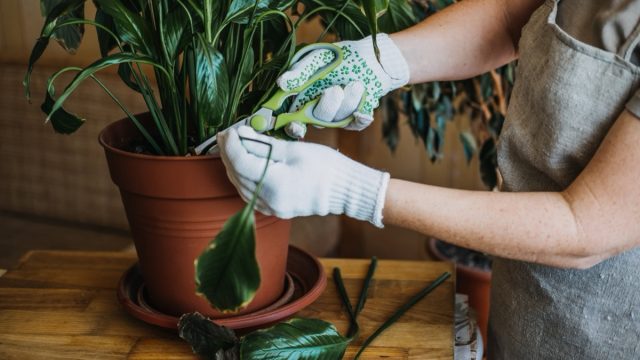
Summer is coming in hot, and while you may love having fun in the sun, your houseplants may have other ideas. Extreme temperatures and high humidity can place stress on your plants, causing them to wilt. However, experts say you don't need to sit idly by as your plants wither under the sun's glare—there are several steps you can take to help your indoor plants withstand summer's most scorching days. Read on to find out which seven tips experts say will prevent your greenery from wilting for a happier, healthier collection of houseplants.
READ THIS NEXT: 7 Outdoor Plants That Can Survive Extreme Heat, Gardening Experts Say.
How to Care for Houseplants in the Heat
1. Give your plants a deep watering.
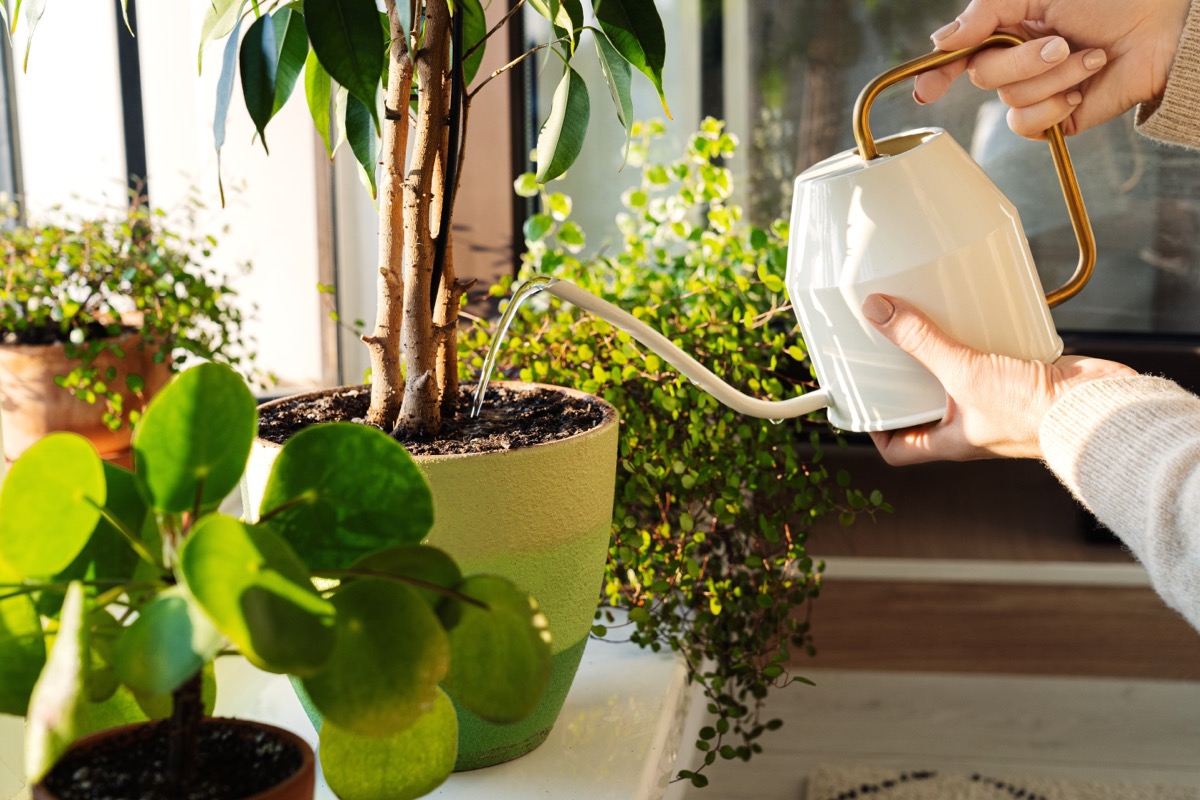
When temperatures rise, your houseplants will need more water than usual. But experts say you don't have to wait until the heat wave hits to give them what they need. If you know hot weather is on its way, watering them deeply in anticipation will help them cope with heat stress.
"The best way to do this is to sit the plant in a bowl or sink of water (or even a bathtub if your plants are large) and allow them to soak up the water over several minutes through the pot's drainage holes," explains Fern Berg, an expert gardener and founder of Tree Vitalize. "Keep an eye on the soil to ensure it is not getting too saturated, then let the plant sit and allow any extra water to drain out before returning the pot to its saucer or planter."
Dale Williams, owner of Bloom'd Florist in Melbourne, Australia, agrees that deep watering is key to summer survival.
"In warmer weather, the soil dries out quickly, which could cause plant withering," Williams says. "Deep watering boosts root development and improves plant resistance to heat stress. To ensure that the roots have enough time to absorb water and to prevent over-drying, water the plants thoroughly but less regularly."
2. Refrain from fertilizing.
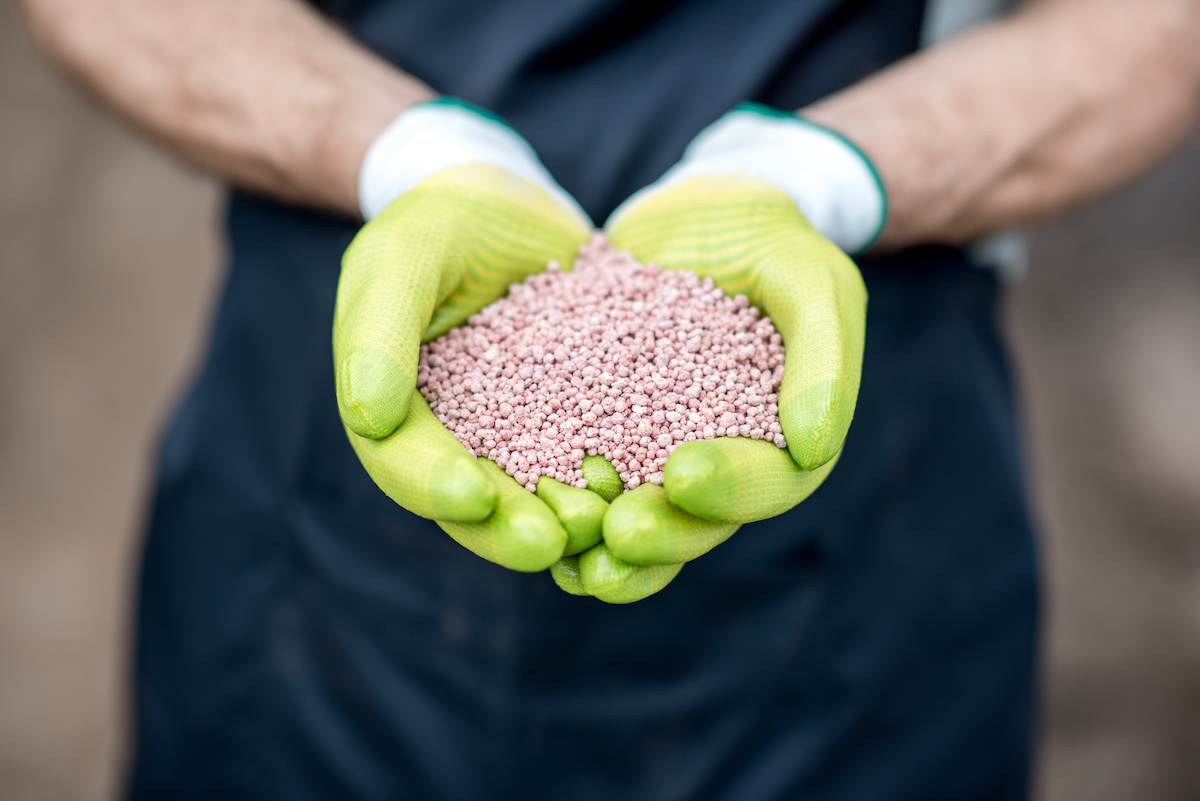
When you see your plants starting to struggle, you may instinctively reach for fertilizers to provide them with some extra nutrients. However, Berg says that fertilizing during hot weather is a common mistake you should avoid.
"The reality is, if your plant is in survival mode due to extreme heat, it will not be able to make use of the extra nutrients provided in the fertilizer, and they may even add further stress to your plant," she says. "In this situation, your plant will thank you for waiting until the weather cools down a bit before you fertilize."
She adds that fertilizing before the start of summer will also enable your plants to build up strength before the worst of the summer heat hits.
READ THIS NEXT: 8 Easy Houseplants That Don't Need Sunlight.
3. Keep pests away.

Williams warns that with hot weather often comes a higher risk of plant-killing pests and diseases. He urges indoor gardeners to stay vigilant against these threats during the summer months.
"Examine your plants frequently for any indications of danger and act quickly if you find anything. Quick action can stop pests and illnesses from spreading and harming your houseplants further," he says.
You may be able to reduce the risk of pests in your houseplants by allowing the top layer of soil to dry between waterings.
4. Move your plants to shaded areas.
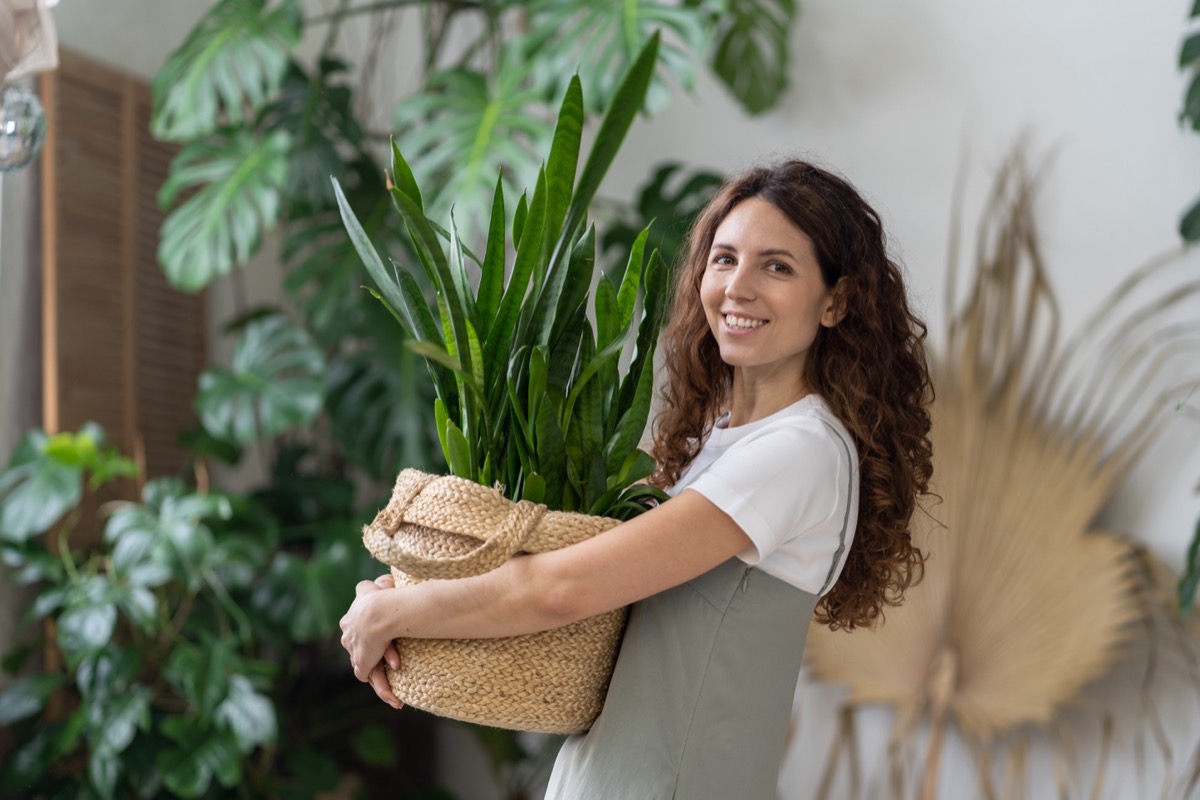
Even if you have houseplants that love sitting in full sun, they may not like it quite as much when temperatures are soaring. Williams says that too much direct sunshine can damage your houseplants' health by burning their leaves and absorbing too much heat. The florist recommends moving them to shaded areas during the warmest hours of the day.
"If there isn't much shade inside, think about using sheer curtains or thin sheets to create a shaded area and protect the plants from direct sunshine," he advises.
READ THIS NEXT: 10 Easy Hacks to Save Your House Plants That Gardeners Swear By.
5. Avoid repotting your plants.
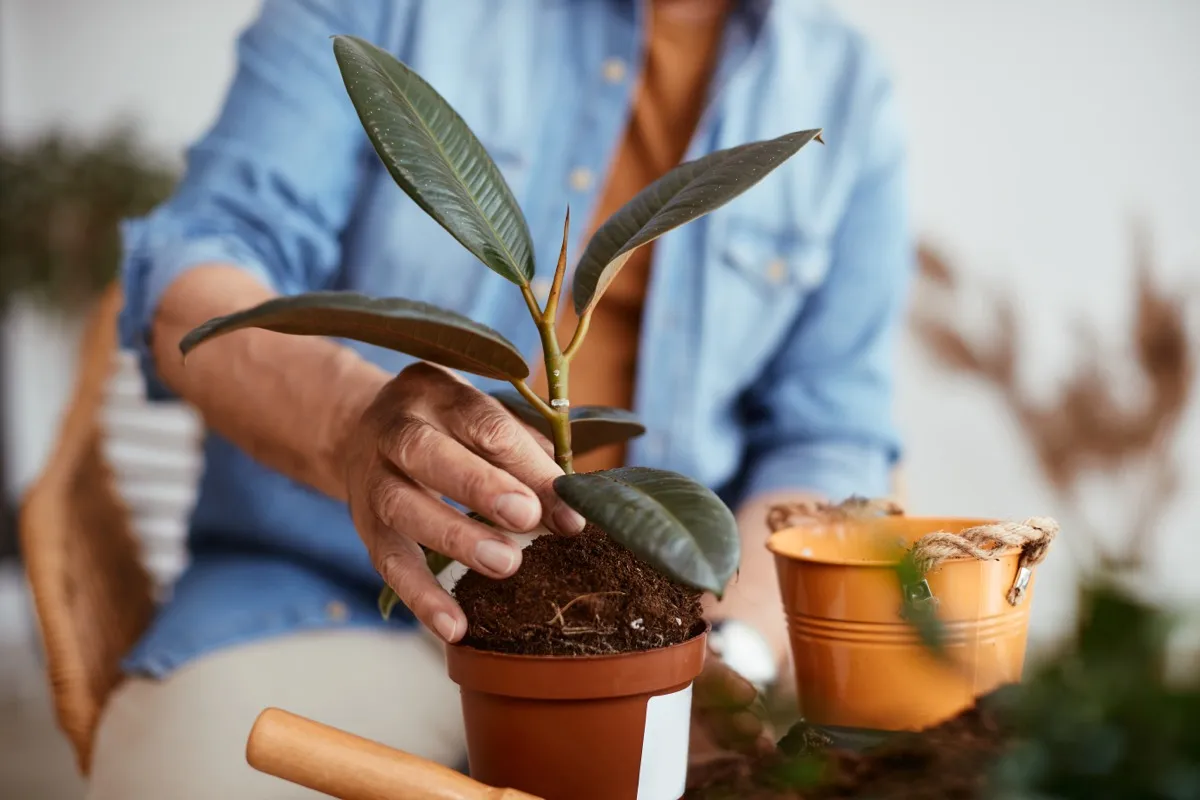
If your plant is wilting in the heat, now is not the time to repot it, says Vladan Nikolic, plant expert and founder of the houseplant care blog Mr. Houseplant.
"Repotting plants during hot weather should be avoided as it adds stress to already vulnerable plants," he tells Best Life. "Since plants are already experiencing the strain of heat, it is essential to refrain from subjecting them to further stress during these conditions."
6. Regulate the humidity.
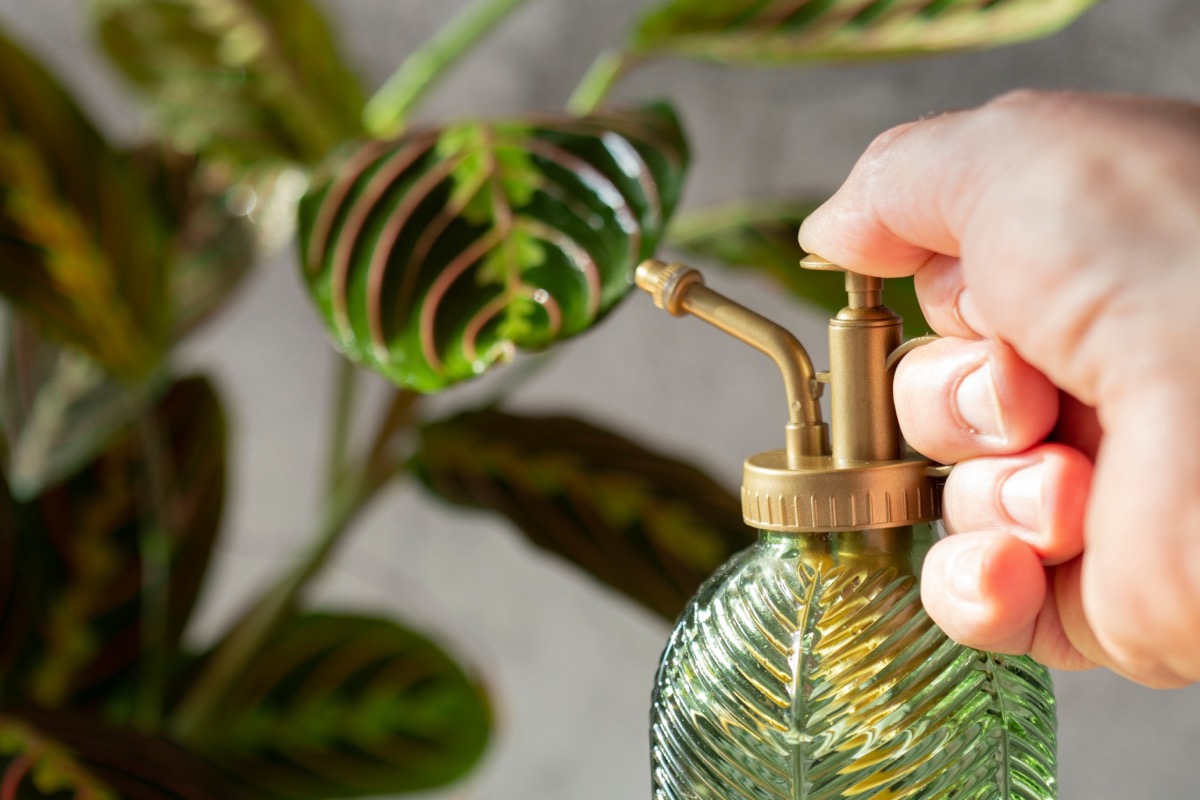
With high heat often comes high humidity. Depending on the types of plants you own, this can wreak havoc on their health. However, experts say that there are steps you can take to counteract a humid day's effects.
Misting your plants regularly—especially if they are a tropical variety— is one way to ensure they retain their normal humidity levels.
Berg adds that you should also be conscious of how air conditioning can cause sudden changes to the humidity levels in your home, and says you should never place a houseplant directly under a fan or air conditioner. "While it can be beneficial to your plant to be in an air-conditioned room, you will want to ensure they are not directly under the cold air as this may stress them further."
Jeffrey Haslehurt, co-creator of Locally Grown Gardens, agrees that regulating humidity is crucial. "In hot weather, the air can get dry, so consider using a humidifier or placing a tray with water near your plants to increase humidity."
For more gardening tips sent directly to your inbox, sign up for our daily newsletter.
7. Provide proper ventilation.

To prevent your plants from wilting on hot days, ventilation is also key, says Haslehurt.
"Good airflow can help indoor plants cope with the heat. However, avoid placing plants in the direct line of an air conditioner or fan as it can lead to rapid dehydration," he says.
Instead, open a window or use a fan to create optimal airflow for your ailing plants.





















